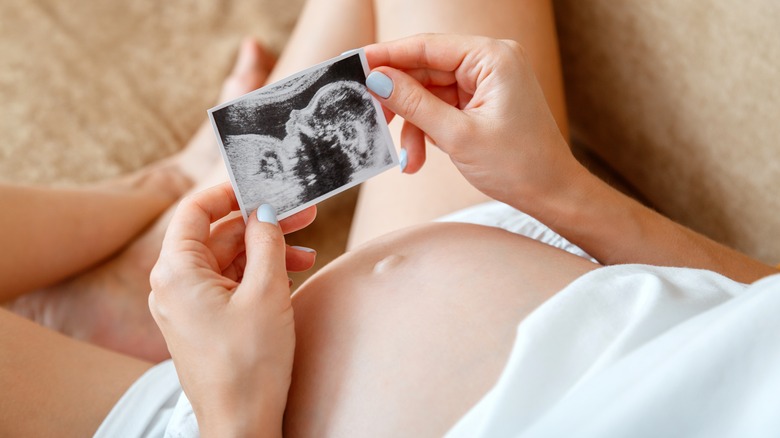The Real Chances Of Becoming Pregnant When Undergoing IVF
If you're thinking of starting IVF or want to know more about the IVF process, it's important to make sure you know exactly what IVF is. This will help you to be realistic as well as feel less panicked when things start to get a little overwhelming.
IVF, which stands for in vitro fertilization (via NHS), is one of the ways those struggling to conceive can have a baby. The basic process consists of an egg being taken from the ovaries and then fertilized with sperm. This happens in a laboratory, with the main goal being that the egg will be returned and then inserted into the person hoping to conceive so it can develop into an embryo and grow within the womb. Though it's most common to use your partner's sperm, it's possible to use donor sperm too.
IVF is still a relatively new process, as the first successful IVF baby was born in 1978 (via WebMD). Nowadays, although it's a well-documented way to get pregnant, IVF can be costly and frustrating. IVF can also have an impact on your mental health due to the drawn-out process from multiple rounds, which is why it isn't for everybody.
The younger you are, the more chance you have of successful IVF
According to Verywellfamily, success with an IVF pregnancy is relatively high if you are under 35. Additionally, using donor eggs also increases the chance of IVF success. In terms of percentages, 54.5% of egg retrievals result in a live birth for women 35 and under. This drops to 41.1% for those aged 35-37, and unfortunately severely declines to 26.7% if you are aged 38-40. However, these percentages are based on using your own eggs. A donor egg is not as impacted by the age of the person carrying the baby due to it being implanted.
Conversely, the stats from a 2020 study conducted by Penn Medicine are significantly lower, with the percentage of live births per egg retrieval being 21.3% for women who used their own eggs. This percentage includes babies that were born full term and at a healthy weight. The women carrying were also all 35 and under.
This lower percentage is why many women choose to do multiple cycles of IVF, though it's often an extremely difficult decision to make. As well as being expensive, IVF can cause major stress for those going through the process. In fact, the MGH Center for Women's Mental Health states that those undergoing IVF experience higher levels of depression, anxiety, and feelings of incompetence compared to those who fall pregnant naturally.
There are things you can do to increase your chances with IVF
Speaking to Parents, Linnea Goodman MD, Assistant Professor of Obstetrics and Gynecology at the UNC School of Medicine, shared that one of the most important things you can do when going through IVF is to maintain a healthy weight. This is because being overweight or underweight can increase the time it takes to conceive with IVF, as well as have a negative effect on success rates. Being in optimal health will create a better environment for any potentially fertilized eggs to grow and thrive.
Moreover, Healthline recommends avoiding red meat, sugar, and highly processed foods. Instead, focus on fresh fruits, vegetables, legumes, and lean proteins like fish and chicken. This recommendation follows the Mediterranean diet, which has been proven to increase fertility rates (via IVF Australia).
You'll also want to make sure you're severely limiting or, better still, stopping your alcohol intake. Everyday things like getting at least 7-8 hours of sleep per night are very important too. The better you feel and the more optimal your health is, the higher chance you have of conceiving. Of course, there is never a guarantee, but the above will help to increase your chances of success with IVF.
It can be a tough and daunting process, and the success rates aren't worth it for a lot of people. Always look into IVF fully before going ahead as, no matter the outcome, your IVF journey is something you will never forget.


